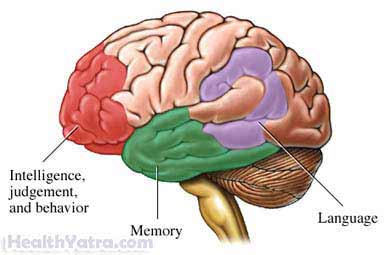Definition
Mild cognitive impairment–amnestic type (MCI-AT) is mild, repeated memory loss. It lies between the normal memory loss of aging and the more serious conditions ofdementia and Alzheimer’s disease (AD). MCI-AT only involves problems with memory. Dementia and Alzheimer’s involve loss of other cognitive abilities, such as:
- Learning
- Reasoning
- Making decisions
- Problems with confusion, language, and attention
People with MCI-AT who are over age 65 have a higher chance of developing dementia and Alzheimer’s. However, many people with MCI-AT never develop these disorders. Some even return to normal.

Causes
The causes are not clear. However, genetic factors may be a cause.
Risk Factors
These risk factors increase your chance of developing MCI-AT. Tell your doctor if you have any of these risk factors:
- Age: 65 and older
- Family history of MCI-AT, dementia, or Alzheimer’s
- Medical conditions, such as high blood pressure, heart disease, diabetes, stroke, head injury, depression, anxiety, infections
- Being overmedicated
- Substance abuse
Research also suggests that these may be risk factors for MCI-AT:
- Lack of physical activity
- Lack of social contact
- Low educational level
- Excessive response to stress
- Poor nutrition and lack of vitamins
- Exposure to toxins
Symptoms
The main symptom is frequent, ongoing memory loss beyond what is normally expected for your age. That means having more than small lapses of memory. If you have MCI-AT, you may:
- Remember much less of what you have just read or seen than people who have only the normal memory changes of aging
- Take longer to recall information
Diagnosis
The doctor will ask about your symptoms and medical history. The doctor may also talk with family members and caregivers. A physical exam will be done.
- Your bodily fluids may be tested. This can be done with:
- Blood tests
- Lumbar puncture —also called a spinal tap
- You may need to have pictures taken of your bodily structures. This can be done with an MRI scan.
- Tests of your cognitive skills may be done, including memory.
If you have this condition, you should have your cognitive abilities tested regularly.
Treatment
Treatment is focused on:
- Preventing, or at least slowing down, further loss of memory and other cognitive abilities
- Preventing dementia and Alzheimer’s disease
Researchers are currently studying the effects that several medicines may have on slowing cognitive decline. Examples include donepezil , vitamin E, galantamine (Razadyne), among others. In some cases, low doses of lithium may be prescribed.
Prevention
The following topics are being studied as ways to reduce the risk of cognitive decline:
- Managing medical conditions that may lead to MCI-AT, especially high blood pressure
- Getting treatment for depression and hypothyroidism
- Staying mentally active by doing things like memory exercises, crossword puzzles, reading, and taking classes
- Getting regular exercise
- Participating in social activities
- Reducing stress
- Getting help for emotional problems
- Eating a healthy diet
